Subaru
Outback Front Brake Pads Replacement Guide
How to change the front disc brake pads
on a fifth generation 2015, 2016, 2017, 2018 & 2019 Subaru Outback wagon.
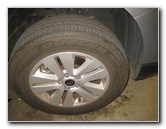 2017 Outback Front Wheel |
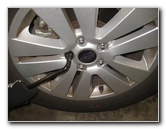 Slightly Loosen Lug Nuts |
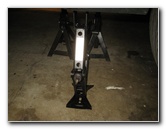 Raise Front of Vehicle |
| This automotive maintenance tutorial
was specifically written to assist owners of the fifth generation
(2015, 2016, 2017, 2018 and 2019
model years) Subaru Outback station wagon in changing the front disc
brake pads and lubricating the caliper slider pins. Owners of other Subaru vehicles such as the Forester, Impreza, Legacy, XV Crosstrek, WRX, BRZ, SVX, Tribeca, Exiga, Trezia, Levorg and Baja may also find these DIY instructions to be helpful. A few compatible sets of new front brake pads with their part numbers are as follows: Bosch BP1078, StopTech 309.10780, Wagner ThermoQuiet QC1078, Akebono ACT1078, Power Stop Z23-1078, Bendix CFC1078, TRW TPC1078, ACDelco 14D1078CH and Monroe CX1078. The tools and other items needed to complete this procedure include a floor jack, two jack stands, a lug nut wrench, a 14mm socket with a 3/8" drive ratchet, a 17mm wrench (to hold the slider pins), an "F" clamp and Sil-Glyde silicone based brake lubricant grease. |
||
|
|
||
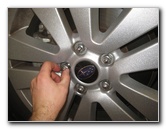 Spin Off Lug Nuts |
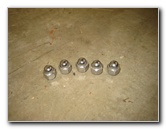 Five Lug Nuts Removed |
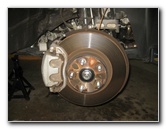 Caliper, Bracket, Rotor |
| The first few steps
are to park the wagon on a level surface, turn off the ignition and then
place the transmission in park. Engage the emergency parking brake and place wheel chocks on both sides of the rear tires to prevent the SUV from moving. I prefer to work on one side of the vehicle at a time to keep three tires on the ground for extra safety. Slightly loosen the five lug nuts on the front wheel by turning them about 1/4 to 1/2 turn in the counterclockwise direction with the tire iron. Raise the front of the car with the floor jack and securely support it with at least two jack stands. Spin off the five lug nuts and set them aside in a safe place. Pull off the front wheel to reveal the caliper, bracket, rotor and the suspension spring. |
||
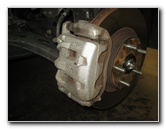 Front Brake Caliper |
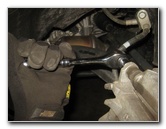 Loosen Top Bolt |
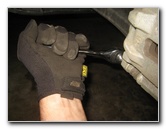 Loosen Bottom Bolt |
| The front brake
caliper is held in place to the bracket by two bolts located on the back
side of the caliper with the bolt heads facing in towards the engine bay. Loosen the two caliper bolts by turning them in the clockwise direction (as seen from the outside of the car) with the 14mm socket and a 3/8" drive ratchet. If the caliper slider pins rotate as you are trying to loosen the caliper bolts, hold them in place with a 17mm wrench. |
||
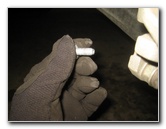 Spin Out Lower Bolt |
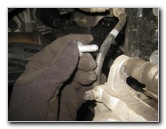 Remove Upper Caliper Bolt |
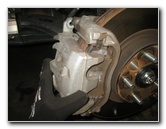 Lift Off Brake Caliper |
| Spin out the two
caliper bolts and set them aside in a safe place. Carefully lift the caliper out of the bracket and off the old inner and outer brake pads. |
||
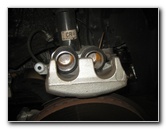 Rest Caliper On Rotor |
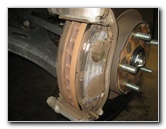 Old Brake Pads Exposed |
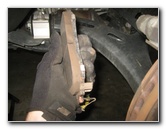 Wear Bar - Bottom Inner Pad |
| Rest the caliper on
the rotor or suspend it from the suspension spring with a bungee cord or tie
it up with some rope. Try to avoid bending, kinking or stressing the rubber brake fluid line. Pull the inner and outer brake pads out of the bracket. Make a mental note of where the wear indicator or "squeal" bar is situated on the old brake pads. On this 2017 Outback, the wear indicator bar was located at the bottom of the inner brake pad. |
||
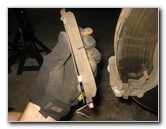 Remove Outer Pad |
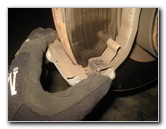 Replace Pad Abutment Clips |
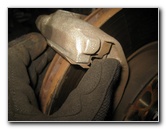 Replace Upper Clip |
| If your set of new
front brake pads includes replacement brake hardware, remove the two pad
abutment or "anti-rattle" clips from the top and bottom of the bracket. Apply a thin layer of silicone based brake caliper lubricant grease to the parts of the new pad abutment clips that will come in contact with the bracket and the "ears" of the new brake pads. Push the new pad abutment clips into the top and bottom of the bracket until they are fully seated. |
||
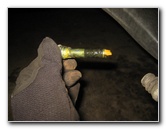 Pull Out Caliper Slider Pins |
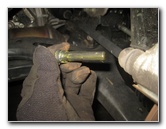 Lubricate & Replace Pins |
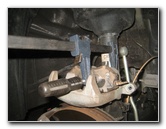 Attach "F" Clamp To Caliper |
| In order for the
brake caliper to operate smoothly, the two caliper slider pins or "guide
bolts" need to be well lubricated. Carefully pull the two caliper slider pins out of their rubber dust boots. Apply a thin layer of silicone based brake caliper grease to the smooth parts of the two caliper slider pins.The preferred rubber safe lubricant for the caliper slider pins is Sil-Glyde. (Do not use petroleum based brake grease since it can cause the rubber parts such as the bushing or "sleeve" on the caliper slider pin or the rubber dust boot to swell which can lead to braking problems. If the rubber bushing swells, the caliper pin may become seized or "frozen" in the bracket leading to reduced braking performance.) Gently push the caliper slider pins back into their rubber dust boots. In order for the caliper to fit over the thicker new brake pads, the two caliper pistons need to be compressed back.. Attach the "F" clamp to the caliper and use the back of an old brake pad to evenly distribute the force from the clamp across the two pistons. |
||
|
|
||
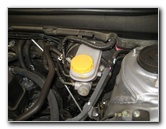 Brake Fluid Reservoir Tank |
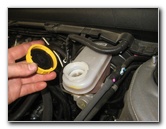 Twist Off Counterclockwise |
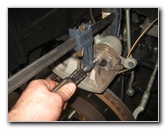 Compress Caliper Piston |
| Move to the right
rear area of the engine bay (closer to the driver's seat) and locate the
brake fluid reservoir which has a yellow plastic cap. Twist off the reservoir cap in the counterclockwise direction and set it aside in a safe place. Removing the reservoir cap will allow the brake fluid to more easily travel back through the system when you compress the caliper pistons. Slowly turn the "F" clamp handle in the clockwise direction to compress back the two caliper pistons. You will probably need to re-position the "F" clamp to fully compress both of the pistons. Continue compressing the pistons until they are almost flush with the rubber dust boots that surround them. Try to avoid pinching or otherwise damaging the rubber dust boots that surround the pistons. |
||
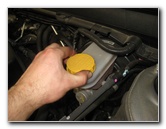 Replace Reservoir Cap |
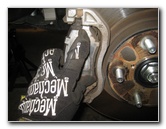 Install New Outer Pad |
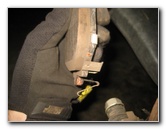 Wear Bar Bottom Inner Pad |
| Replace the
reservoir cap as soon as possible. Brake fluid is "hygroscopic" so it easily
absorbs moisture from the air which can lead to reduced braking performance. Thoroughly clean off the brake rotor, caliper bracket, brake caliper assembly and the lug studs with brake parts cleaner spray. Do not use compressed air or blow with your mouth to clean off the brake parts. Inhaling brake dust can be harmful to your health since brake dust may be carcinogenic (cancer causing) if inhaled. Apply a thin layer of brake parts lubricant grease to any area where there is metal to metal contact such as the outer lip of the caliper piston. Do not apply brake caliper grease to the friction surface of the new pads or the rotor.
(To remove the existing rotors and install new ones, remove the two 17mm bolts on the rear of the caliper bracket that attach it to the steering knuckle. Then loosen the old rotor with a rubber mallet, pull it off, and slide the new one in its place. The original service manual for the 2015 Outback specifies a torque value of 59 lb-ft for the 17mm front caliper bracket bolts The updated 2015 Outback FSM now lists 88.5 lb-ft (or 120 N*m) as the correct torque specification. The 17mm front brake caliper bracket bolts torque specification in the 2017 Outback service manual is 88.5 lb-ft. Update - The previous version of the service manual specified a torque value of 59 lb-ft for the 17mm front caliper bracket bolts. Although the bolts for previous model years may have been a different part number than the 2016, 2017, 2018 and 2019+ model years. Update - The service manual for the 2019 Subaru Outback and Subaru Legacy lists 99.6 lb-ft (or 135 N*m) as the correct torque specification for the 17mm front "caliper support bracket" bolts. I'm not sure why Subaru has different torque values for the same bolt on different model years in the same vehicle generation unless the bolt part numbers have changed or the engineers just decided that the bolts should be tighter for safety issues or due to technician and customer feedback. There are two part numbers for the 17mm caliper bracket bolts which are Subaru 901000316 and 901260023. Both are M12x1.25 and the same "grade" (strength / hardness / material). Please verify this torque specification for your vehicle's model year and trim level. I recommend buying the Bosch BP1078 "QuietCast" front brake pads since they have excellent reviews on Amazon. Install the two new brake pads into the bracket with the wear indicator bar situated at the bottom of the inner brake pad. |
||
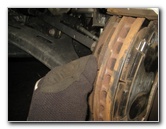 Install New Inner Pad |
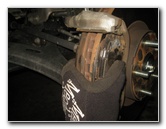 Push Pads Against Rotor |
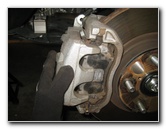 Lower Caliper Over Pads |
| The metal spring
clips should be located at the bottom of both pads. (The spring clips help
keep the pads from rubbing against the rotor when the brakes are not in
use.) Push the two pads together until they are flush against the rotor. Carefully lower the caliper over the new pads and into the bracket. If the caliper won't fit over the thicker new brake pads, you may need to compress the two pistons back a bit further. |
||
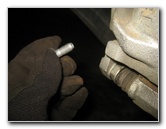 Line Up Bolt Holes |
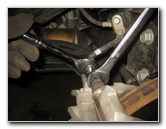 Tighten Caliper Bolts |
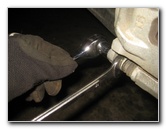 Wrench Hold Slider Pins |
| Line up the bolt
holes in the caliper with their corresponding holes in the slider pins
within the bracket. Tighten the two caliper bolts by turning them in the counterclockwise direction (as seen from the outside of the vehicle). If the slider pins turn as you are attempting to tighten the caliper bolts, hold them in place with a 17mm wrench. Tighten the two bolts to just past hand tight or about 20 lb-ft of torque if you have a torque wrench. (The 2015 Outback service manual lists the front brake torque specifications as follows: 14mm caliper bolt 19.9 lb-ft, 17mm bracket bolt 59 lb-ft and 10mm bleeder screw 5.9 lb-ft.) |
||
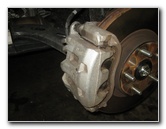 Caliper Secured To Bracket |
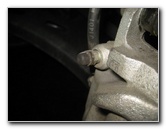 Rubber Valve Cap |
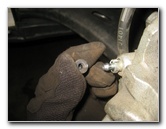 Brake Fluid Bleeder Valve |
| Double check that
the two caliper bolts are tight before you move on to the following steps. If your Outback's brake pedal has been feeling soft or spongy, the brake fluid may be contaminated with water or the brake lines might contain some air bubbles. It would be best to bleed the brake lines at this time in order to flush out the old fluid and replace it with new DOT 3 brake fluid. For more on this topic, please take a look at my Brake Line Fluid Bleeding With An Assistant DIY Guide or there is also my Brake Line Fluid Bleeding With A Power Bleeder Guide. The brake fluid bleeder valve is located underneath a rubber cap on the back side of the caliper just below the top caliper bolt. |
||
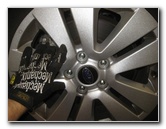 Push On Front Wheel |
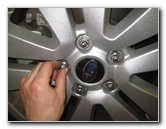 Spin On Five Lug Nuts |
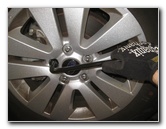 Slightly Tighten Lug Nuts |
| Carefully push the
front wheel back into place. Spin on the five lug nuts a few turns by hand in the clockwise direction to prevent them from becoming cross threaded. Slightly tighten the lug nuts in a "criss cross" or "star" pattern with the tire iron. |
||
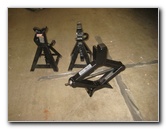 Lower Car From Floor Jack |
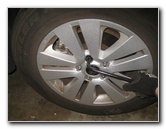 Torque To 88.5 lb-ft |
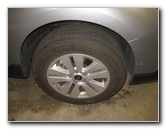 Front Brake Pads Replaced |
| Carefully lower the
car from the jack stands by using the floor jack. Continue progressively tightening the lug nuts in a criss cross or star pattern to about 1/4 turn past hand tight. It would be best to use a torque wrench or an electric impact wrench with a torque stick to properly tighten the lug nuts. The owner's manual lists the lug nut torque specification as being 88.5 lb-ft of torque. Sit in the driver's seat of the vehicle and firmly push down the brake pedal a few times to restore the brake line pressure. Check the brake fluid in the reservoir and verify that it is at the proper level. If it is low, pour in some fresh DOT 3 brake fluid from a new bottle. To break in your new front brake pads, just try to drive normally for the first few hundred miles while avoiding any hard or "panic" stops which might glaze over the new pads and cause them to become noisy and not perform as well. It's also a good idea to regularly check your driveway, garage or parking spot for drops of fresh brake fluid which might indicate a leak, check the brake fluid level in the reservoir and also verify that the lug nuts are still tight. Be sure to record the brake pad change in your vehicle's service records. For more,
please check out all of my
2015-2018 Subaru Outback DIY Repair & Maintenance Guides. |
||
| If you found this guide to be helpful,
please consider making a small donation by clicking on the PayPal.com
"Donate" button located to the right of this paragraph. Thank you!
(Note: I am not a registered charity. Donations are not tax deductible.) |

